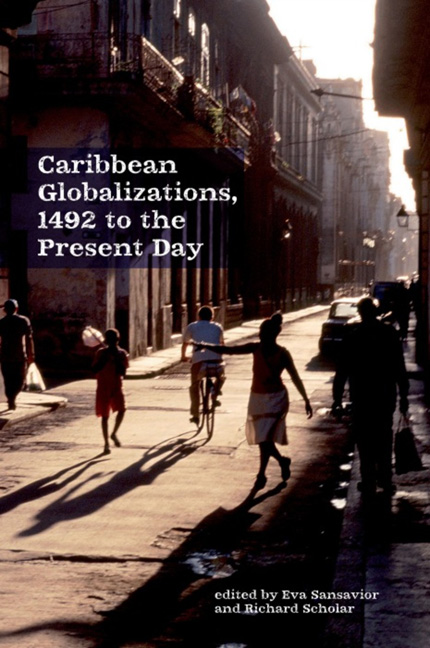Book contents
- Frontmatter
- Contents
- Contributors
- Prologue: Globalization, Globality, Globe-Stone
- Introduction
- I Globalizations in the Making
- 1 The Archipelago Goes Global: Late Glissant and the Early Modern Isolario
- 2 How Globalization Invented Indians in the Caribbean
- 3 Precocious Modernity: Environmental Change in the Early Caribbean
- 4 ‘Slaves’ in My Family: French Modes of Servitude in the New World
- 5 Paradoxical Encounters: The Essay as a Space of Globalization in Montaigne's ‘Des Cannibales’ and Maryse Condé's ‘O Brave New World’
- II The Complex Present
- Acknowledgements
- Index
3 - Precocious Modernity: Environmental Change in the Early Caribbean
from I - Globalizations in the Making
- Frontmatter
- Contents
- Contributors
- Prologue: Globalization, Globality, Globe-Stone
- Introduction
- I Globalizations in the Making
- 1 The Archipelago Goes Global: Late Glissant and the Early Modern Isolario
- 2 How Globalization Invented Indians in the Caribbean
- 3 Precocious Modernity: Environmental Change in the Early Caribbean
- 4 ‘Slaves’ in My Family: French Modes of Servitude in the New World
- 5 Paradoxical Encounters: The Essay as a Space of Globalization in Montaigne's ‘Des Cannibales’ and Maryse Condé's ‘O Brave New World’
- II The Complex Present
- Acknowledgements
- Index
Summary
Long considered a backward region, the Caribbean was in fact a leading edge of environmental development in the early modern era. The agricultural revolution that occurred in the Caribbean was one of the most radical and intense anywhere in the modern world, with the region's plantations generating highly regimented, quality-controlled, mass-produced agricultural products. Deforestation occurred earlier, perhaps more intensively, here than anywhere else in the Americas. Whether it was the search for gold, pearls, mahogany, turtleshell, or sugar, such commodities generated a ‘boom’ or ‘wild-west’ mentality, as people hastened to seize a fleeting bounty, and take advantage of an ephemeral bonanza. A short life-expectancy sharpened the ‘get-rich-quick’ mentality. Yet this level of exploitation, together with the fragility of island environments, encouraged concepts of rarity and heightened concerns about conservation.
Proximity to Europe and Africa introduced alien diseases earlier and more frequently to the Antilles than elsewhere in the Americas; this virulent disease environment helped account for the high mortality. Because the region came to host a range of tropical diseases and because it was such a hub of trade, its microbiotic traffic was particularly intense. The destruction wrought on Amerindians was almost total. The Caribbean was a crossroads of contagion, a notably lethal place, where the velocity of infection was swift. This vulnerability, together with an exotic location, fostered an empirical and experimental approach to medicine, based on observation and experience, informing new theories of disease causation and courses of treatment (Cook, 1998: 15–59).
Living in a multinational world in close proximity to one another— whether in adjoining territories, sometimes occupying the same island, or inhabiting colonies that frequently changed hands over time—facilitated cooperation as well as conflict, emulation as well as rivalry, borrowings as well as repudiations across imperial lines. Botanic and cartographic exchanges—just to mention a couple of pertinent examples—illustrate these themes, and point to the avant-garde character of the Caribbean. The early modern Caribbean was a crucible of change, as empires and peoples collided and colluded, capital flowed in and commodities flowed out, as diseases wreaked havoc and knowledge circuits intensified. A precocious global modernity characterizes the region in general. In these—and no doubt other—ways, the Caribbean was in the vanguard of change.
- Type
- Chapter
- Information
- Caribbean Globalizations, 1492 to the Present Day , pp. 83 - 104Publisher: Liverpool University PressPrint publication year: 2015



